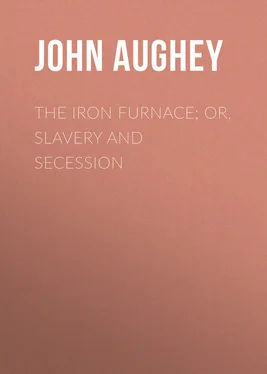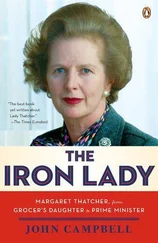John Aughey - The Iron Furnace; or, Slavery and Secession
Здесь есть возможность читать онлайн «John Aughey - The Iron Furnace; or, Slavery and Secession» — ознакомительный отрывок электронной книги совершенно бесплатно, а после прочтения отрывка купить полную версию. В некоторых случаях можно слушать аудио, скачать через торрент в формате fb2 и присутствует краткое содержание. ISBN: , Жанр: foreign_antique, foreign_prose, Историческая проза, на английском языке. Описание произведения, (предисловие) а так же отзывы посетителей доступны на портале библиотеки ЛибКат.
- Название:The Iron Furnace; or, Slavery and Secession
- Автор:
- Жанр:
- Год:неизвестен
- ISBN:http://www.gutenberg.org/ebooks/38855
- Рейтинг книги:3 / 5. Голосов: 1
-
Избранное:Добавить в избранное
- Отзывы:
-
Ваша оценка:
- 60
- 1
- 2
- 3
- 4
- 5
The Iron Furnace; or, Slavery and Secession: краткое содержание, описание и аннотация
Предлагаем к чтению аннотацию, описание, краткое содержание или предисловие (зависит от того, что написал сам автор книги «The Iron Furnace; or, Slavery and Secession»). Если вы не нашли необходимую информацию о книге — напишите в комментариях, мы постараемся отыскать её.
The Iron Furnace; or, Slavery and Secession — читать онлайн ознакомительный отрывок
Ниже представлен текст книги, разбитый по страницам. Система сохранения места последней прочитанной страницы, позволяет с удобством читать онлайн бесплатно книгу «The Iron Furnace; or, Slavery and Secession», без необходимости каждый раз заново искать на чём Вы остановились. Поставьте закладку, и сможете в любой момент перейти на страницу, на которой закончили чтение.
Интервал:
Закладка:
CHAPTER II.
VIGILANCE COMMITTEE AND COURT-MARTIAL
The election of Delegates to determine the status of Mississippi – The Vigilance Committee – Description of its members – Charges – Phonography – No formal verdict – Danger of Assassination – Passports – Escape to Rienzi – Union sentiment – The Conscript Law – Summons to attend Court-Martial – Evacuation of Corinth – Destruction of Cotton – Suffering poor – Relieved by General Halleck.
Soon after this sermon was preached, the election was held. Approaching the polls, I asked for a Union ticket, and was informed that none had been printed, and that it would be advisable to vote the secession ticket. I thought otherwise, and going to a desk, wrote out a Union ticket, and voted it amidst the frowns and suppressed murmurs of the judges and bystanders, and, as the result proved, I had the honour of depositing the only vote in favour of the Union which was polled in that precinct. I knew of many who were in favour of the Union, who were intimidated by threats, and by the odium attending it from voting at all. A majority of secession candidates were elected. The convention assembled, and on the 9th of January, 1861, Mississippi had the unenviable reputation of being the first to follow her twin sister, South Carolina, into the maelstrom of secession and treason. Being the only States in which the slaves were more numerous than the whites, it became them to lead the van in the slave-holders’ rebellion. Before the 4th of March, Florida, Alabama, Georgia, Louisiana and Texas had followed in the wake, and were engulfed in the whirlpool of secession.
It was now dangerous to utter a word in favour of the Union. Many suspected of Union sentiments were lynched. An old gentleman in Winston county was arrested for an act committed twenty years before, which was construed as a proof of his abolition proclivities. The old gentleman had several daughters, and his mother-in-law had given him a negro girl. Observing that his daughters were becoming lazy, and were imposing all the labour upon the slave, he sent her back to the donor, with a statement of the cause for returning her. This was now the ground of his arrest, but escaping from their clutches, a precipitate flight alone saved his life.
Self-constituted vigilance committees sprang up all over the country, and a reign of terror began; all who had been Union men, and who had not given in their adhesion to the new order of things by some public proclamation, were supposed to be disaffected. The so-called Confederate States, the new power, organized for the avowed purpose of extending and perpetuating African slavery, was now in full blast. These soi-disant vigilance committees professed to carry out the will of Jeff. Davis. All who were considered disaffected were regarded as being tinctured with abolitionism. My opposition to the disruption of the Union being notorious, I was summoned to appear before one of these august tribunals to answer the charge of being an abolitionist. My wife was very much alarmed, knowing that were I found guilty of the charge, there was no hope for mercy. Flight was impossible, and I deemed it the safest plan to appear before the committee. I found it to consist of twelve persons, five of whom I knew, viz., Parson Locke, Armstrong, Cartledge, Simpson, and Wilbanks. Parson Locke, the chief speaker, or rather the inquisitor-general, was a Methodist minister, though he had fallen into disrepute among his brethren, and was engaged in a tedious strife with the church which he left in Holmes county. The parson was a real Nimrod. He boasted that in five months he had killed forty-eight raccoons, two hundred squirrels, and ten deer; he had followed the bloodhounds, and assisted in the capture of twelve runaway negroes. W. H. Simpson was a ruling elder in my church. Wilbanks was a clever sort of old gentleman, who had little to say in the matter. Armstrong was a monocular Hard-shell-Baptist. Cartledge was an illiterate, conceited individual. The rest were a motley crew, not one of whom, I feel confident, knew a letter in the alphabet. The committee assembled in an old carriage-shop. Parson Locke acted, as chairman, and conducted the trial, as follows.
“Parson Aughey, you have been reported to us as holding abolition sentiments, and as being disloyal to the Confederate States.”
“Who reported me, and where are your witnesses?”
“Any one has a right to report, and it is optional whether he confronts the accused or not. The proceedings of vigilance committees are somewhat informal.”
“Proceed, then, with the trial, in your own way.”
“We propose to ask you a few questions, and in your answers you may defend yourself, or admit your guilt. In the first place, did you ever say that you did not believe that God ordained the institution of slavery?”
“I believe that God did not ordain the institution of slavery.”
“Did not God command the Israelites to buy slaves from the Canaanitish nations, and to hold them as their property for ever?”
“The Canaanites had filled their cup of iniquity to overflowing, and God commanded the Israelites to exterminate them; this, in violation of God’s command, they failed to do. God afterwards permitted the Hebrews to reduce them to a state of servitude; but the punishment visited upon those seven wicked nations by the command of God, does not justify war or the slave-trade.”
“Did you say that you were opposed to the slavery which existed in the time of Christ?”
“I did, because the system of slavery prevailing in Christ’s day was cruel in the extreme; it conferred the power of life and death upon the master, and was attended with innumerable evils. The slave had the same complexion as his master; and by changing his servile garb for the citizen dress, he could not be recognised as a slave. You yourself profess to be opposed to white slavery.”
“Did you state that you believed Paul, when he sent Onesimus back to Philemon, had no idea that he would be regarded as a slave, and treated as such after his return?”
“I did. My proof is in Philemon, verses 15 and 16, where the apostle asks that Onesimus be received, not as a servant, but as a brother beloved?”
“Did you tell Mr. Creath that you knew some negroes who were better, in every respect, than some white men?”
“I said that I knew some negroes who were better classical scholars than any white men I had as yet met with in Choctaw county, and that I had known some who were pre-eminent for virtue and holiness. As to natural rights, I made no comparison; nor did I say anything about superiority or inferiority of race; I also stated my belief in the unity of the races.”
“Have you any abolition works in your library, and a poem in your scrap-book, entitled ‘The Fugitive Slave,’ with this couplet as a refrain,
‘The hounds are baying on my track;
Christian, will you send me back?’”
“I have not Mrs. Stowe’s nor Helper’s work; they are contraband in this region, and I could not get them if I wished. I have many works in my library containing sentiments adverse to the institution of slavery. All the works in common use amongst us, on law, physic, and divinity, all the text-books in our schools – in a word, all the works on every subject read and studied by us, were, almost without exception, written by men opposed to the peculiar institution. I am not alone in this matter.”
“Parson, I saw Cowper’s works in your library, and Cowper says:
‘I would not have a slave to fan me when I sleep,
And tremble when I wake, for all the wealth
That sinews bought and sold have ever earned.’”
“You have Wesley’s writings, and Wesley says that ‘Human slavery is the sum of all villany.’ You have a work which has this couplet:
Читать дальшеИнтервал:
Закладка:
Похожие книги на «The Iron Furnace; or, Slavery and Secession»
Представляем Вашему вниманию похожие книги на «The Iron Furnace; or, Slavery and Secession» списком для выбора. Мы отобрали схожую по названию и смыслу литературу в надежде предоставить читателям больше вариантов отыскать новые, интересные, ещё непрочитанные произведения.
Обсуждение, отзывы о книге «The Iron Furnace; or, Slavery and Secession» и просто собственные мнения читателей. Оставьте ваши комментарии, напишите, что Вы думаете о произведении, его смысле или главных героях. Укажите что конкретно понравилось, а что нет, и почему Вы так считаете.










![John Bruce - The Lettsomian Lectures on Diseases and Disorders of the Heart and Arteries in Middle and Advanced Life [1900-1901]](/books/749387/john-bruce-the-lettsomian-lectures-on-diseases-and-disorders-of-the-heart-and-arteries-in-middle-and-advanced-life-1900-1901-thumb.webp)

